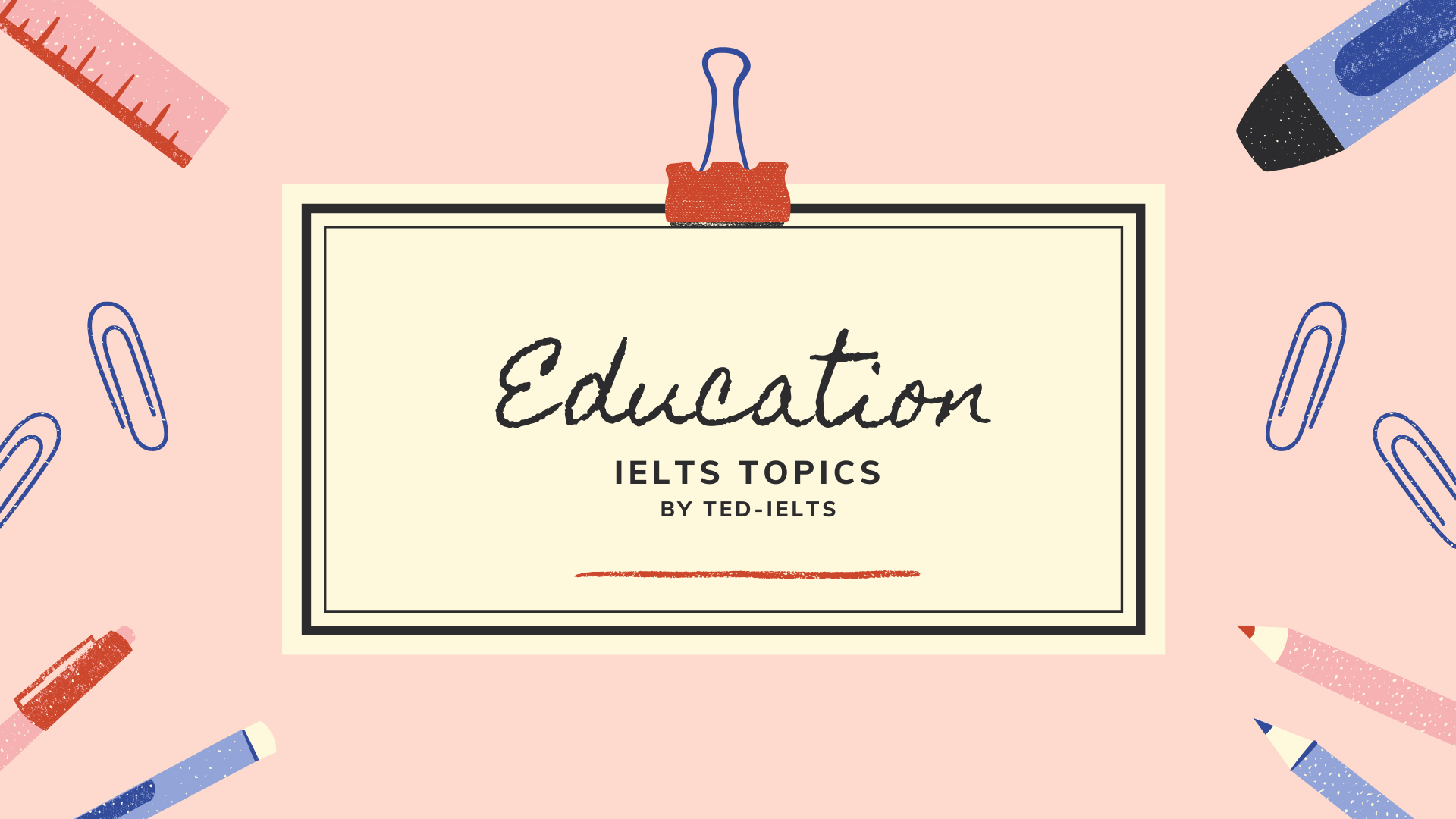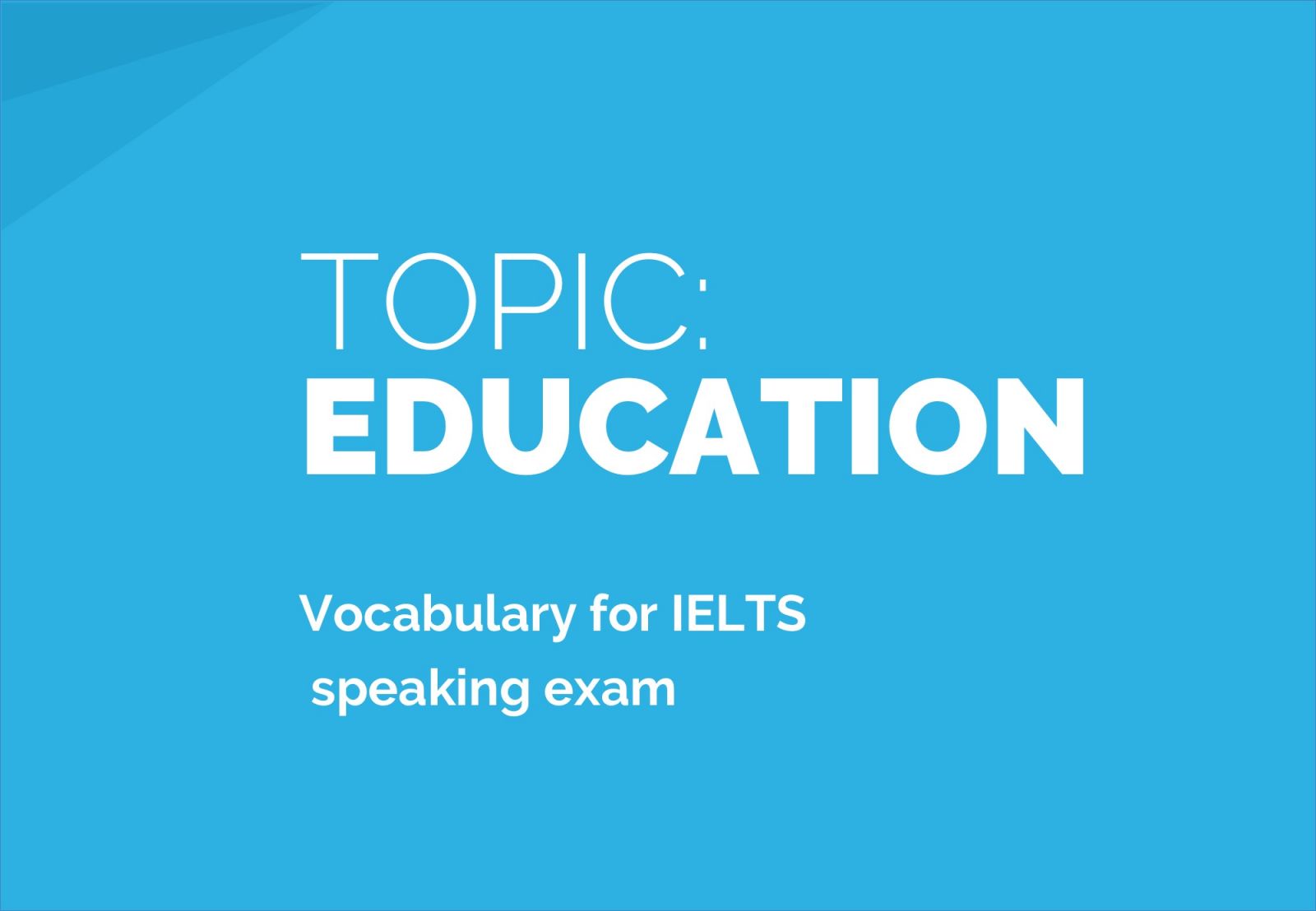Education (Giáo dục) là chủ đề quan trọng thường xuyên được đề cập trong kỳ thi IELTS. Cho dù bạn đang chuẩn bị cho học phần Academic hay General Training, vốn từ vựng IELTS chủ đề Education phong phú và đa dạng có thể nâng cao đáng kể band của bạn. Trong bài viết này, Aten English sẽ đi sâu vào các từ vựng IELTS cần thiết liên quan đến giáo dục, giúp bạn diễn đạt ý tưởng của mình một cách chính xác và trôi chảy hơn.
Từ vựng IELTS chủ đề Education cơ bản
Dưới đây là một số từ vựng IELTS chủ đề Education cơ bản mà bạn có thể gặp trong kỳ thi IELTS:

- Education System (Hệ thống giáo dục):
- Primary education: Giáo dục tiểu học
- Secondary education: Giáo dục trung học cơ sở
- Higher education: Giáo dục đại học
- School Facilities (Cơ sở vật chất của trường):
- Classroom: Phòng học
- Library: Thư viện
- Laboratory: Phòng thí nghiệm
- Playground: Sân chơi
- Academic Subjects (Các môn học):
- Mathematics: Toán học
- Science: Khoa học
- Literature: Văn học
- History: Lịch sử
- Geography: Địa lý
- Examinations and Assessments (Kỳ thi và Đánh giá):
- Exam: Kỳ thi
- Test: Bài kiểm tra
- Assessment: Đánh giá
- Grading system: Hệ thống xếp hạng
- Teaching and Learning (Giảng dạy và Học tập):
- Teacher: Giáo viên
- Student: Sinh viên, học sinh
- Curriculum: Chương trình học
- Lecture: Bài giảng
- Educational Levels (Cấp độ giáo dục):
- Undergraduate: Sinh viên đại học
- Graduate: Sinh viên sau đại học
- Postgraduate: Sau đại học
- Educational Policies (Chính sách giáo dục):
- Inclusive education: Giáo dục tích hợp
- Online education: Giáo dục trực tuyến
- Lifelong learning: Học suốt đời
- Education and Society (Giáo dục và Xã hội):
- Literacy: Sự biết chữ
- Equality in education: Bình đẳng trong giáo dục
- Access to education: Tiếp cận giáo dục
- Learning Resources (Tài nguyên học tập):
- Textbook: Sách giáo trình
- E-learning materials: Tài liệu học trực tuyến
- Educational apps: Ứng dụng giáo dục
- Educational Methods (Phương pháp giáo dục):
- Interactive learning: Học tương tác
- Collaborative learning: Học nhóm
- Self-directed learning: Học tự học
- Educational Trends (Xu hướng giáo dục):
- Blended learning: Học kết hợp
- Flipped classroom: Lớp học đảo ngược
- Online courses: Các khóa học trực tuyến
- Educational Challenges (Thách thức giáo dục):
- Dropout rate: Tỷ lệ bỏ học
- Educational inequality: Bất bình đẳng giáo dục
- Lack of resources: Thiếu nguồn lực
- School Administration (Quản lý trường học):
- Principal: Hiệu trưởng
- School board: Ban giám hiệu
- Administrative staff: Nhân viên quản lý
- Learning Outcomes (Kết quả học tập):
- Academic achievement: Thành tích học tập
- Critical thinking skills: Kỹ năng tư duy phê phán
- Problem-solving abilities: Khả năng giải quyết vấn đề
- Global Education (Giáo dục toàn cầu):
- International students: Sinh viên quốc tế
- Cultural exchange: Trao đổi văn hóa
- Global citizenship: Quốc tịch toàn cầu
- Extracurricular Activities (Hoạt động ngoại khóa):
- Sports clubs: Câu lạc bộ thể thao
- Art and music programs: Chương trình nghệ thuật và âm nhạc
- Volunteering opportunities: Cơ hội làm tình nguyện
- Educational Research (Nghiên cứu giáo dục):
- Academic journals: Tạp chí học thuật
- Research methodology: Phương pháp nghiên cứu
- Data analysis: Phân tích dữ liệu
Bài mẫu IELTS Speaking Part 2 chủ đề Education
Đề bài: Describe a teacher who had a great influence on you.
Bài mẫu: I’d like to talk about Mrs. Robinson, my high school English teacher. She was not just a teacher; she was a mentor who left a lasting impact on my academic and personal development.
Mrs. Robinson had an incredible passion for literature, and her enthusiasm was contagious. She made every lesson engaging by incorporating discussions, group activities, and creative projects. What set her apart was her ability to connect the themes in literature to real-life situations, making the content relatable and thought-provoking.
Beyond academics, Mrs. Robinson took a genuine interest in her students’ well-being. She created a supportive environment where students felt comfortable expressing their thoughts and opinions. I remember struggling with self-confidence during my high school years, and Mrs. Robinson played a pivotal role in encouraging me to find my voice.
Her feedback on my writing was constructive and motivational. Instead of focusing solely on mistakes, she highlighted strengths and areas of improvement. This positive approach not only improved my writing skills but also boosted my self-esteem.
Mrs. Robinson’s influence extended beyond the classroom. She organized extracurricular book clubs, encouraging students to explore literature beyond the curriculum. These activities fostered a sense of community among students who shared a love for reading.
In conclusion, Mrs. Robinson was more than a teacher; she was a mentor who instilled a passion for literature, boosted my confidence, and created a supportive learning environment.

Tham khảo: Ôn tập từ vựng gia đình Family Vocabulary IELTS
Bài mẫu IELTS Writing Task 2 chủ đề Education
Dưới đây là một bài mẫu IELTS Writing Task 2 có sử dụng từ vựng IELTS chủ đề Education cho phần viết kiểu Argumentative (luận điểm):
Bài mẫu:
In today’s educational landscape, the issue of assigning homework to children has become a topic of debate. While some argue that homework is detrimental to a child’s well-being, others assert that it plays a crucial role in reinforcing classroom learning. This essay will examine both perspectives before presenting my own stance on the matter.
On the one hand, those against homework argue that it adds unnecessary stress to a child’s life. Young learners, especially those in primary schools, already spend a considerable amount of time at school. Advocates of this view contend that children need ample time to engage in extracurricular activities, play, and develop social skills. They argue that overloading them with homework hampers their holistic development and may lead to burnout.
On the other hand, proponents of homework believe that it is indispensable for reinforcing classroom learning and cultivating discipline. Homework provides students with an opportunity to apply what they have learned in class independently. It helps in solidifying concepts and fosters a sense of responsibility and time management. Moreover, it prepares students for the expectations of higher education and the workforce, where independent learning is paramount.
In my opinion, the answer lies in finding a balanced approach. While excessive homework can be detrimental, moderate and purposeful assignments can enhance a student’s educational experience. Teachers should carefully design homework tasks that complement classroom instruction and cater to the individual needs of students. This way, homework can be a valuable tool for reinforcing learning without causing undue stress.
In conclusion, the debate over whether children should be given homework is multifaceted. Both perspectives have valid points, and the key is to strike a balance that benefits the child’s overall development. Homework, when used judiciously, can contribute to a student’s academic success and personal growth.
Bạn hãy chăm chỉ ôn luyện IELTS Vocabulary để nâng cao vốn từ vựng của mình nhé!


